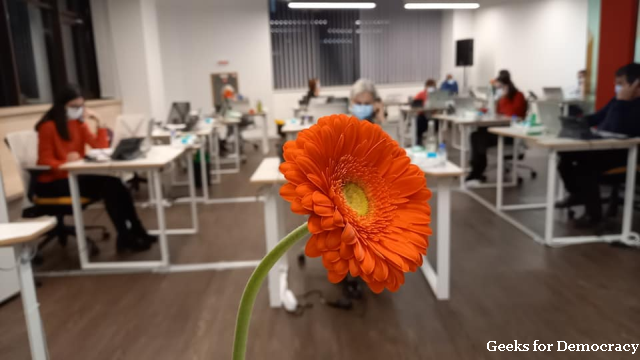Civic Support for the Authorities in Combating the Pandemic
Geeks for Democracy volunteers to answer calls about on behalf of the public healthcare board in Bucharest

Christine Leșcu, 09.12.2020, 13:00
This pandemic has taken Romania by surprise, as it did the entire world, exposing a healthcare system with many gaps and bad management, for the most part of the population. The local public healthcare boards, charged with identifying and quarantining cases of the novel coronavirus, still have a hard time coping with the requests for testing, tracing, and public information. One of the main reasons is the lack of staffing. Which is why a domestic NGO took the initiative to help the Public Healthcare Board in Bucharest, the PHB, to set up a support center, in order to manage phone calls.
The coordinator of the call center, Diana Voicu, told us how it happened:
“The idea came to us last summer. It was still the month of July, and we realized that, as the summer relaxation arrived, we would soon have another surge. And, lo and behold, in late summer, as the number of cases was rising, the phone line at the Public Healthcare Board got answered less and less. Which is why we offered to take over the burden. We took advantage of the experience gathered by the Geeks for Democracy organization during the lockdown in spring, when we rolled out the project Shopping At Your Door, where people could buy food, basic needs products, or medicine if they couldnt get out of the house. We opened a call center for this project, and since we already had the experience, we wanted to lend a helping hand. Unfortunately, we could only put it into practice starting on November 3rd. It was only in October that the Romanian Special Telecommunications Service provided us with the offices vacated by another NGO, Impact HUB, which provided us with 30 work stations, phone lines, computers, and dedicated landlines. We started answering phones on November 3rd, and then we had a rate of over 90% phone calls answered from people who needed help.”
Since its opening, the call center works with volunteers, with shifts that run from 8 AM to 10 PM. Right now, over 170 volunteers work here for three hour or longer shifts, some even for six hours, because some of them are doing it while holding down jobs. Diana Voicu told us how they came about securing this help:
“This allowed our colleagues from the Health Board to redirect their phone operators to other functions, because the PHB has many roles. The tracing teams were supplanted due to this. We work well with them, and we got great feedback, both from them, but especially from the people who now feel they are being listened to. We answer calls from people who want to get tested, who suspect they are displaying symptoms, or who are quarantined because of contact with a virus positive person, and who want an ambulance. Others want to find out the results of the test, or want to get the right papers for quarantining, because that provides them with home healthcare. Sometimes they want to know what they have to do in case they need to travel, or if they have a dental emergency if they are already stuck at home. That means that every day we handle between 500 and 800 calls.”
The callers handled by the Geeks for Democracy organization get the proper information, or get redirected to experts if they have more intricate questions. In addition, the organization has developed a free smartphone app to register all the requests. All the requests get a registration number on a standard form and get sent to the PHB. Also, the Board ticks the box on whether the request has been handled, which can be seen by the applicant.
The call center experience brings the volunteers not only the satisfaction of helping others, but also a study in patience and diplomacy. Alexandra Turcu, who studies software engineering in the Netherlands, is among the volunteers. She lives in Romania now, attending classes remotely, and she answers phones while managing a team of volunteers, from 8 AM to 2PM. She told us why she made this choice:
“I chose to volunteer because I have a lot of people I know who faced the following situation: they called the PHB and no one answered. In addition, Ive been volunteering for the last 15 or 16 years, and every time I can help someone I do it, for the sake of everyone. There are many people who face a huge bureaucracy in addition to struggling with the disease.”
We asked Alexandra Turcu about the most frequent requests that people have:
“Right now the biggest problem is the conditions for quarantine. There are people who cannot take their paid medical leave. They are scared, because they have bank loan payments, have kids to raise, and the holidays are getting close. They are desperate because they dont get the quarantine papers on time. We try to calm them down and give them information. This would be the most widespread problem. During the first days, when we started, we got a lot of thanks from people, because their calls were answered and they had a sympathetic voice on the other end, listening to them. They were happy to have feedback and could find out what was happening with them or their papers. There are plenty of people who are angry, but by the time they hang up they do so with a smile.”
Since more and more people need a smile, the people with the Geeks for Democracy organization feel that more call centers are needed. However, this is up to the local healthcare boards, and up to the people who deem it necessary to volunteer.






























